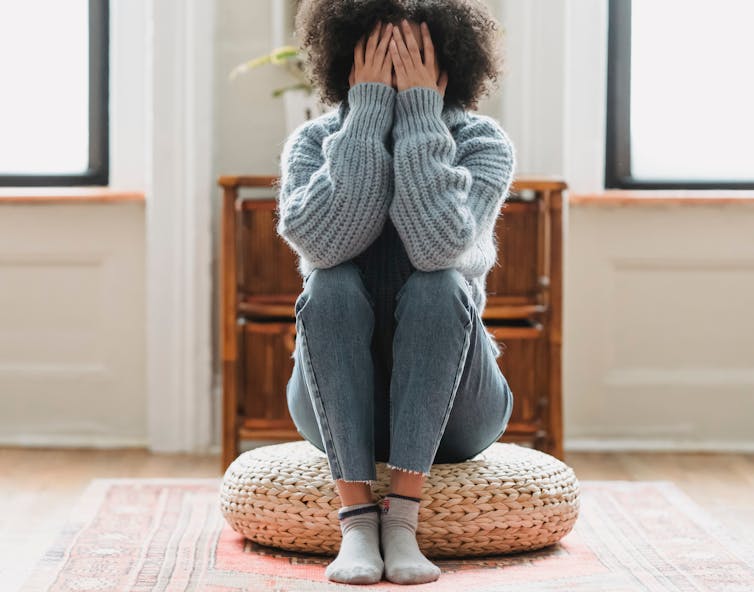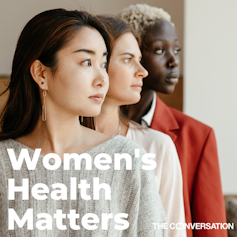
Carve out time for yourself to avoid getting overwhelmed. pexels/liza summer, CC BY-SA Lowri Dowthwaite-Walsh, University of Central Lancashire
Something strange is going on in women’s happiness research. Because despite having more freedom and employment opportunities than ever before, women have higher levels of anxiety and more mental health challenges, such as depression, anger, loneliness and more restless sleep. And these results are seen across many countries and different age groups.
A recent survey conducted by the American Psychological Association may hold some clues as to why. The results found that most US women are unhappy with how society treats them.
Many women are still the main caregivers for children and elderly relatives. Most also have the double burden of managing the home and family arrangements on top of paid work responsibilities. And within the workplace three in five women have experienced bullying, sexual harassment or verbal abuse.
The gender gap in wellbeing was notably documented during the pandemic, as many women took on more domestic and caregiving responsibilities on top of work. But it was also noted that although women took a bigger hit to their wellbeing they were quicker to recover, which seems to indicate thatwomen are more emotionally resilient than men. 

This article is part of Women’s Health Matters, a series about the health and wellbeing of women and girls around the world. From menopause to miscarriage, pleasure to pain the articles in this series will delve into the full spectrum of women’s health issues to provide valuable information, insights and resources for women of all ages.
One of the factors that may contribute towards women’s resilience is social connection. In one 2019 study, researchers found that women scored higher than men for positive relationships with others as well as capacity for personal growth. In essence, women tend to be better than men at getting support. They ask for help sooner and so are more likely to overcome adversity quicker.
Women have also been found to place greater value on social connections than men. Studies have found that women’s friendships are more intimate – women favour face-to-face interactions that enable more self-disclosure and emotional support. Whereas men’s friendships tend to be more side by side, pursuing shared activities. Think catching up watching a football match versus catching up over coffee. Again this may explain the buffer to women’s mental health.
Happiness versus purpose
Although women may not be as happy in the moment as men and face greater social inequality, a recent study suggests that women report having more purpose in their lives. And having meaning and purpose in life is associated with better health and living longer. 

Women are more likely to take on caregiving roles as well as volunteer to help other people. pexels/andrea piacquadio, CC BY
The study found that women tend to engage in more altruistic endeavours, such as supporting others and charity volunteering which leads to a greater sense of meaning and purpose.
However, the researchers also point out that this is likely linked to cultural norms of women being encouraged to put the needs of others first. While putting others first does not necessarily make you happier, having a sense of meaning in life definitely contributes towards happiness.
Given all this, women need to make time for themselves to protect their wellbeing. Here are four evidence-based ways to help you do this:
1. Try therapy
Having a place just for you, where you can talk about how you feel and express your emotions is important for your psychological wellbeing. Art-based therapies are particularly beneficial for women as are group-based interventions that allow women to speak openly with other women – which can reduce feelings of stigma and shame.
2. Connect with nature
Spending time outdoors in natural settings can be very comforting. A recent study found that nature-based interventions are particularly healing for women who have experienced trauma or illness . Indeed, as women, our biology and values often align with the natural world. The term “Mother Earth” reflects the feminine tendency to be life-giving and nurturing.
So make sure you factor some time outside in nature into your daily or weekly plans. A walk on the beach, a run through the woods or reading a book in the park, it all helps.
3. Move yourself
Studies show that when women engage in regular physical activity it increases self-acceptance and personal growth. Aerobic exercise is particularly helpful for cognitive health as women age. High impact, weight-bearing exercise such as jumping and running improve bone health for women in middle age and regular moderate exercise, such as walking has been shown to improve symptoms of the menopause.
4. Cut down on alcohol
Women face gender-specific risks related to alcohol, including a greater risk of being a victim of violence and more health-related issues such as heart disease and breast cancer. Women also become intoxicated quicker than men which can make them more vulnerable.
Given that women are twice as likely as men to experience anxiety, reducing or eliminating alcohol may be sensible. Indeed, research shows quitting alcohol can significantly improve women’s health and happiness.

Lowri Dowthwaite-Walsh, Senior Lecturer in Psychological Interventions, University of Central Lancashire
This article is republished from The Conversation under a Creative Commons license. Read the original article.
Categories: Generation,
Health,
Life Style,
Society,
Therapy,
USA,
Women
